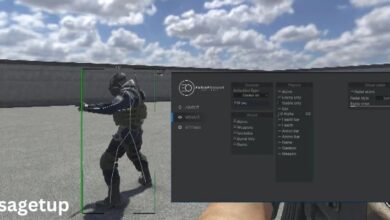Rust Console Commands: Unlock Hidden Features Instantly

In the vast landscape of programming languages, Rust stands out for its performance, safety, and concurrency features. However, harnessing the full power of Rust often requires proficiency not only in writing code but also in navigating the command-line interface. In this comprehensive guide, we delve into the world of Rust console commands, empowering you to streamline your development workflows, troubleshoot with ease, and optimize your Rust projects for peak performance.
Introduction to Rust Console Commands
Rust console commands serve as the gateway to unlocking the true potential of the language. Whether you’re compiling code, managing dependencies, or debugging issues, the command line is where Rust developers wield their tools with precision. Understanding the fundamentals of Rust console commands is essential for anyone embarking on their journey into Rust development.
The beauty of Rust console commands lies in their simplicity and power. With just a few keystrokes, you can compile complex Rust programs, manage project dependencies effortlessly, and dive deep into the internals of your codebase. By mastering these commands, you gain a newfound level of control and efficiency over your Rust projects, empowering you to tackle even the most daunting programming challenges with confidence.
Getting Started with Rust Console Commands
Before diving into the world of Rust console commands, it’s essential to set up your development environment properly. Installing Rust on your system is a straightforward process, thanks to Rust’s comprehensive toolchain. Once installed, you’ll have access to a suite of powerful command-line tools, including rustc and cargo, Rust’s package manager and build system.
With Rust installed, the next step is to familiarize yourself with the Rust console. Whether you’re using a terminal emulator or an integrated development environment (IDE), the command line serves as your primary interface for interacting with Rust. From compiling code to managing project dependencies, the Rust console is where the magic happens, providing you with the tools you need to bring your ideas to life.
Basic Rust Console Commands
At the heart of Rust development are two essential console commands: rustc and cargo. rustc is the Rust compiler, responsible for transforming your Rust source code into executable binaries. With rustc, you have full control over the compilation process, allowing you to fine-tune optimizations, specify target architectures, and more.
On the other hand, cargo is Rust’s package manager and build system, designed to simplify the process of managing Rust projects. With cargo, you can create new projects, build, test, and run your code, and manage dependencies effortlessly. By harnessing the power of cargo, you can focus on writing code without getting bogged down by the intricacies of project management.
Navigating the Rust Console Environment
Once you’ve mastered the basics of compiling and managing Rust code, it’s time to explore the broader ecosystem of Rust console commands. From navigating directories and manipulating files to understanding file permissions and ownership, the Rust console provides a rich set of tools for interacting with your filesystem.
In addition to basic file operations, the Rust console also offers powerful text manipulation tools, allowing you to search, replace, and transform text with ease. Whether you’re refactoring code or analyzing log files, the Rust console has you covered, providing a seamless experience for working with text-based data.
Working with Rust Code Using Console Commands
With a solid understanding of the Rust console environment, it’s time to roll up your sleeves and start writing some code. Whether you’re creating new Rust source files, compiling code from the command line, or running Rust programs, the Rust console provides everything you need to bring your ideas to life.
One of the key advantages of working with Rust code from the console is the ability to integrate seamlessly with other command-line tools and utilities. Whether you’re piping output between commands, chaining commands together with pipelines, or redirecting output to files, the Rust console makes it easy to orchestrate complex workflows with precision and efficiency.
Advanced Rust Console Commands
Once you’ve mastered the basics of Rust console commands, it’s time to level up your skills with some advanced techniques and tools. From formatting Rust code with rustfmt to managing Rust toolchains with rustup, the Rust ecosystem offers a wealth of powerful tools for optimizing your development workflow.
For those looking to take their Rust development to the next level, tools like cargo-edit and cargo-doc provide invaluable assistance for managing dependencies and generating documentation for your projects. By incorporating these tools into your workflow, you can streamline your development process and focus on what matters most: writing great code.
Optimizing Rust Development with Console Commands
Optimizing Rust code for performance and efficiency is a key concern for many developers, and the Rust console provides a rich set of tools for tackling these challenges head-on. Whether you’re profiling code to identify bottlenecks, benchmarking performance to measure improvements, or analyzing memory usage to optimize resource utilization, the Rust console has you covered.
By harnessing the power of the Rust console, you can gain deep insights into the performance characteristics of your code and identify opportunities for optimization. Whether you’re working on a small hobby project or a large-scale production application, the Rust console provides the tools you need to unlock the full potential of your Rust code.
Integrating Rust Console Commands into Development Workflows
One of the key advantages of working with Rust console commands is the ability to integrate seamlessly into your existing development workflows. Whether you’re using version control with Git, automating tasks with shell scripts, or setting up continuous integration and deployment pipelines, the Rust console provides the flexibility and power you need to streamline your development process.
By incorporating Rust console commands into your development workflows, you can automate repetitive tasks, enforce best practices, and ensure consistency across your projects. Whether you’re working on a solo project or collaborating with a team, the Rust console provides the tools you need to stay productive and focused on delivering great software.
Tips and Best Practices for Using Rust Console Commands
As with any programming language or tool, there are certain tips and best practices to keep in mind when working with Rust console commands. From naming conventions and project organization to writing clean and maintainable code, these best practices can help you stay organized, efficient, and focused on writing great software.
When it comes to naming conventions, consistency is key. By following established naming conventions for Rust projects and files, you can make your code more readable and maintainable, both for yourself and for other developers who may work on your code in the future. Similarly, organizing your project directory structure in a logical and intuitive manner can help streamline your workflow and make it easier to find and navigate your code.
Troubleshooting Rust Console Commands
Despite the power and versatility of Rust console commands, you may encounter issues from time to time. Whether you’re dealing with compilation errors, runtime crashes, or unexpected behavior, it’s essential to know how to troubleshoot effectively and resolve issues quickly.
When troubleshooting Rust console commands, it’s essential to start by understanding the nature of the problem. Is it a syntax error in your code, a missing dependency, or something else entirely? By narrowing down the scope of the problem, you can focus your efforts on finding a solution more efficiently. Additionally, don’t hesitate to leverage online resources such as documentation, forums, and community chat channels for assistance. Chances are, someone else has encountered a similar issue and can offer guidance on how to resolve it.
You read also more





